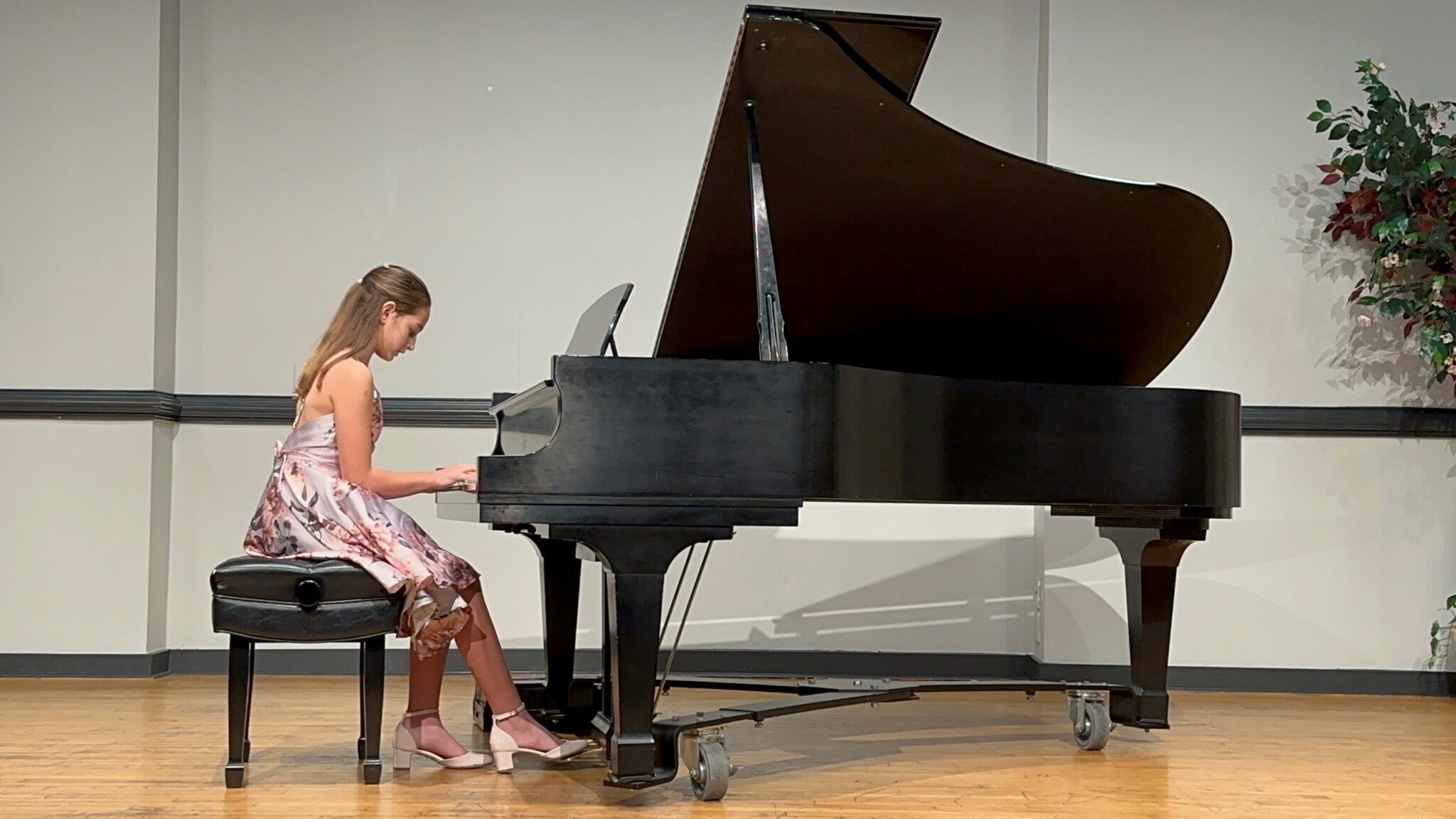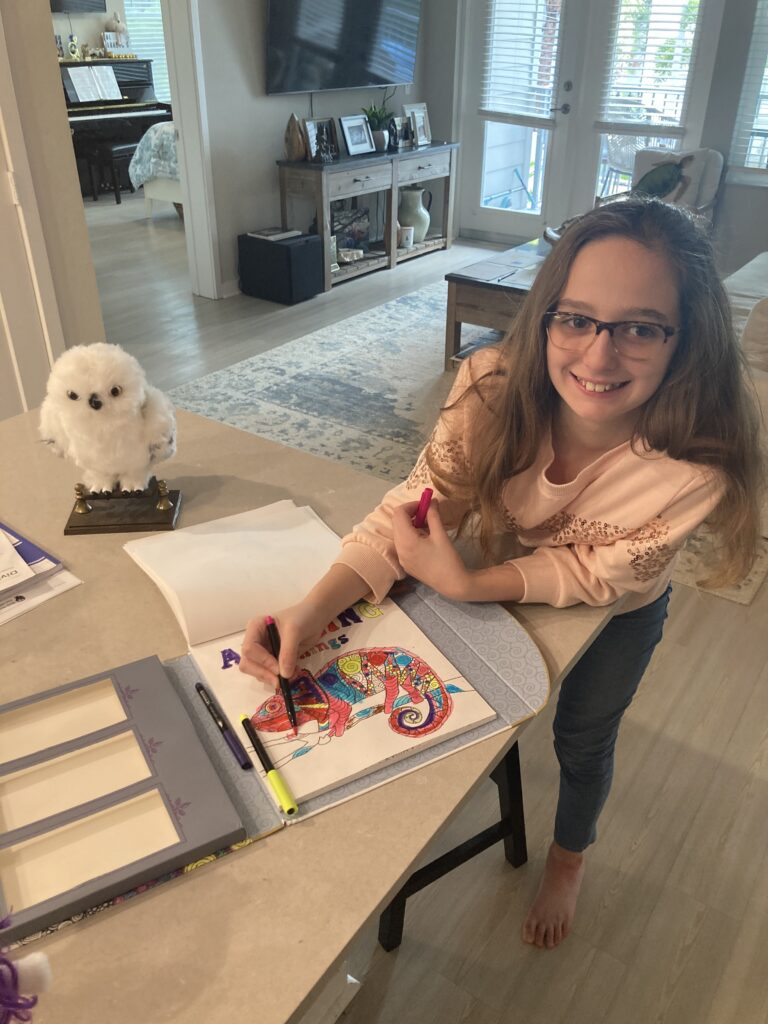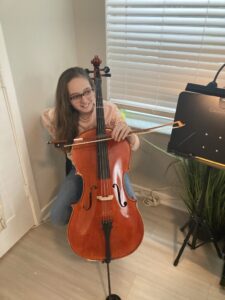
Emma's goal is to play piano in an orchestra.
CLEARWATER – On the desk inside Emma Coto’s bedroom is a sign that says, “This Girl Can.” That’s as good of a place as any to begin this story because sitting at the piano next to the desk is Emma, and she’s playing the theme to “Jurassic Park,” her favorite movie.
Emma is 11, and she can also play the cello. She can speak French and Spanish. She can dig for fossils along the banks of the Peace River somewhere near Arcadia, where she once unearthed a Megalodon tooth.
That’s a lot of can for someone whose chances of living when she was an infant were, according to one doctor, “slim and none.”
“He said we had better odds of winning the lottery,” said Lynda Coto, Emma’s mom.
Emma was days old when she suffered a stroke. Tumors were found on her pancreas, and she quickly had 85% of her pancreas removed. The stroke caused life-threatening epileptic seizures, which she endured for her first seven years.
A medical procedure in 2019, in which a pacemaker-like device was implanted at the base of Emma’s skull to monitor and control her seizures, greatly improved her quality of life. She hasn’t had a seizure in more than three years.
Florida’s Family Empowerment Scholarship for Students with Unique Abilities helped uncover Emma’s musical talent when her parents purchased a keyboard with funds from the program’s Education Savings Account (ESA).
“We took all of these extracurricular activities (available with the ESA) and just started throwing them at the wall, see which ones stuck,” Lynda said. “And many of them didn't stick.”
But the keyboard did, and now Emma has a clear vision for her future.
“I want to play in an orchestra,” she said.
And …
“I want to be a paleontologist,” she quickly added.
Emma’s fight for survival began in November 2012 with a stroke shortly after she was born.
Lynda, a registered nurse, sensed problems with her baby that doctors didn’t see, and tests didn’t always reveal. There were plenty of questions but not many answers. So, Lynda and her husband, Danny, fought.
And fought.
“There's a lot of specialists out there that will meet a parent and say, ‘Look, there's really nothing we can do to fix it. You just have to accept it,’ and I'm like, ‘I'm not doing that. Sorry, that's not that's not me. I'm not accepting this,’” Lynda said.

Emma has many interests. Art is one. The Harry Potter books and movies are also high on the list. That's Hedwig, a talking model of Harry Potter's owl.
Emma was treated by epilepsy neuropsychologists, epilepsy surgeons, and more than a dozen epileptologists. She spent time at hospitals in Tampa, Pennsylvania, and Boston.
After one electroencephalogram, Lynda and Danny were told their daughter’s brain was so damaged that her mental capacity would never develop beyond that of a kindergartener.
“They said Emma was not going to progress mentally, socially, emotionally, or academically, past a five-year-old level,” Lynda said.
When Emma was 7, Lynda’s and Danny’s persistence paid off.
At Boston Children’s Hospital, Emma had a responsive neurostimulation (RNS) system installed at the base of her skull. The RNS is small and records brain activity, sending electrical stimulation to stop seizures.
Now Emma could run and play with other children. She could dig for fossils.
Mentally, socially, emotionally, and academically, Emma progressed to where she should be as an 11-year-old and maybe a bit beyond.
Emma loves history and science. She loved all things Harry Potter and “Jurassic Park.”
She loves Taylor Swift and John Williams. Swift you know. Williams, you might, since he composed the music for a number of blockbuster movies, including "Jurassic Park," "Star Wars," and the first three Harry Potter movies.
The scholarship really set the foundation for what I have here,” Lynda said as she nodded at Emma.
Emma has used the ESA to pay for her occupational, physical, and speech therapies that she no longer needs. She now uses it to pay for her music lessons. It did pay part of her tuition to a private school, but Emma is now homeschooled, so the ESA pays for the curriculum.

Emma calls the cello her "fun instrument."
While she is doing well academically (it took her four months to complete the second-grade curriculum, and she is now learning fourth-grade math), Lynda feels her daughter will benefit from a return to the classroom.
“One of the things that is missing in homeschooling is that social connection,” Lynda said. “This little girl is very social.”
Lynda, Danny, and Emma are currently touring private schools in the Tampa Bay area. Lynda said the choice will be Emma’s, and she knows that choice will come down to the school with the best music program.
“Music grounds her,” Lynda said.
“It helps me relax,” Emma said.
Spread along the shelf of her piano are 10 awards Emma earned for playing.
“She’s a joy to teach,” said Carla O’Connor, Emma’s piano teacher. “She works toward perfection.”
That was clear when Emma, playing “Minuet in G” on her piano, missed a note.
“That’s OK,” Lynda said.
“No, it’s not,” Emma said while she continued to play.
O’Connor has been working with Emma for more than two years. She said her ability to learn a new piece is amazing.
“She processes the music so quickly,” O’Connor said. “I teach a lot of theory, and she understands all the different concepts. She picks it up immediately and runs with it. Her memorization skills are off the wall. If I give her a song, she can come back the next week, and it's practically memorized.”
The ability to play the piano is often the gateway to another instrument. For Emma, that’s the cello.
“My fun instrument,” she called it.
Emma began playing six months ago, and according to Fred Gratta, her cello teacher, she has made great strides.
“Emma is so eager to learn. She really has a hunger for knowledge, always ready to move forward,” Gratta said. “I can see the wheels turning in her head when I ask her to try something new. She’s really excited about music and the instrument.”
Emma tells Gratta, “I want to learn everything.”
Emma will perform for the Florida Music Teachers Association in the spring. She will be evaluated on three pieces that she must memorize. She is eligible to be considered to attend a summer camp at the Berklee College of Music in Boston when she turns 12. Gratta said Emma can one day be a member of the Pinellas Youth Symphony.
O’Connor said Emma can one day achieve her goal of playing in an orchestra as an adult.
“Absolutely,” O’Connor said. “I can see that.”
Lynda said there is a force that all parents possess that kicks into overdrive when they are fighting for their child’s life. The road wasn’t easy, Lynda said, but they never stopped pressing forward. From one specialist to another. From one hospital in one state to another hospital in another state.
“There is this magnificent energy that just pushes you, and you have no choice,” she said. “Thank God for that energy, that forward motion. Because without it, I don’t think we would be capable of serving our children.”
There is another sign in Emma’s room. It says, “Be Amazing.”
Emma is all of that.
“I think one thing that’s really neat about this scholarship is it enabled Emma to be a very well-rounded individual,” Lynda said. She can wear a real pretty dress and play some beautiful piano, and then she can go in the dirt and dig for fossils, and, literally, she is as happy as can be.”
This girl can.